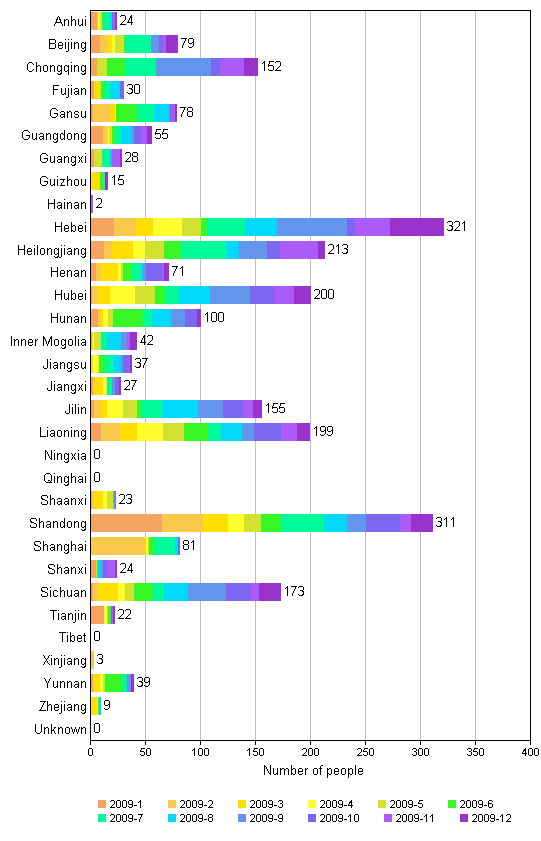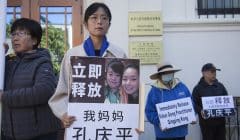Arbitrary Arrest and Imprisonment
Chapter 4, 2010 Annual Report

Chart: Falun Dafa practitioners illegally detained in the year of 2009
“Falun Gong practitioners make up one of the largest groups of detainees in the camps.” – Chinese Human Rights Defenders report on “re-education through labor” camps, February 2009
“In recent months, scores of practitioners have been given long prison terms, including Zhang Xingwu, a retired physics professor from Shandong Province who last week was sentenced to seven years after the police found Falun Gong literature in his apartment.” – The New York Times, April 27, 2009 [1]
Chinese security forces continued to abduct large numbers of Falun Gong practitioners during 2009, with over 2,500 cases documented by the Falun Dafa Information Center. Following their abduction, hundreds of Falun Gong practitioners were sent to “re-education through labor” camps and prison camps for up to 18 years by administrative fiat or following sham trials. An unknown number of adherents were held at other facilities, including detention centers, psychiatric institutions, and “brainwashing” centers.
In total, independent expert Ethan Gutmann estimated that 450,000 to 1 million Falun Gong practitioners were in custody at any given time. Other accounts supported the estimate of hundreds of thousands of Falun Gong detainees, rendering practitioners the largest group of prisoners of conscience in China and perhaps the world.
Since the repression began in 1999, hundreds of thousands of Falun Gong practitioners have been arbitrarily imprisoned in labor camps, “brainwashing” centers, mental institutions, detention centers, and prison camps. In 2009, researcher Ethan Gutmann estimated, based on dozens of interviews with former detainees, that Falun Gong practitioners constitute 15 to 20 percent of detainees in “re-education through labor” camps, prison camps, and long-term detention facilities at any given time. Drawing on credible reports of the overall population in these facilities being between 3 million and 5 million, Gutmann estimates that 450,000 to 1 million Falun Gong adherents are in detention at any given time. [2]
Such a figure, reinforced by other independent reports of practitioners making up a significant percentage of detainees in labor camps (see below), renders Falun Gong adherents the single largest group of prisoners of conscience in China and perhaps the world.
Large-scale abductions in 2009
Thousands of adherents were arbitrarily detained throughout China in 2009. The Falun Dafa Information Center confirmed 2,513 such abductions, with the largest numbers being in Hebei and Shandong provinces (see chart below). Given the difficulty of obtaining information from inside China, however, the actual number of detained adherents is certainly much higher. To illustrate, each of the documented cases required that those close to the abducted adherent be aware of the detention and have the wherewithal and courage to break through the internet blockade to inform outsiders about the case. When such circumstances are absent, an adherent may be abducted without the outside world’s knowledge.
The scope of Falun Gong abductions in 2009 is further supported by evidence cited in the Congressional-Executive Commission on China’s 2009 Annual Report:
As security intensified ahead of the 10th anniversary of the ban [on Falun Gong], the ‘strike hard’ campaign resulted in widespread detentions and imprisonment of Falun Gong practitioners. … In February 2009, Dazhou municipality in Sichuan province disclosed that public security officials had detained 114 practitioners … Huai’an city officials in Jiangsu province noted that they had ‘‘cracked’’ more than 20 cases in the first half of 2009 that resulted in Falun Gong detentions. [3]
The trend of large-scale abductions corresponding to the politically sensitive tenth anniversary of the campaign against Falun Gong follows a previous escalation in abductions ahead of the 2008 Beijing Olympics, when security forces detained over 8,000 adherents.
Among cases documented by the Falun Dafa Information Center, most victims were arrested on the basis of their being known to the authorities as Falun Gong practitioners, even if this identity consisted of studying Falun Gong tenets and practicing its meditation exercises in the privacy of their homes. In many cases, adherents were abducted after they were found possessing Falun Gong books and related materials, either after door-to-door searches by security agents or upon being stopped on the street.
Long-term incarceration
Following their abduction, Falun Gong practitioners are typically taken to detention centers. If they are not granted release, possibly thanks to pressure or payments by family members or employers, adherents are then taken to “re-education through labor” camps or “sentenced” in sham trials to prison camps for long-term incarceration. Although sentences to “re-education through labor” camps remain the most common type of imprisonment used, in 2008 and 2009 a significant proportion of practitioners were also “sentenced” to long terms in prison camps.
Between January and December 2009, the Center documented 1,392 cases of practitioners being given prison sentences following sham trials, with some ranging up to 18 years. This represents a notable increase in the use of judicial channels to imprison Falun Gong practitioners compared to previous years. This shift enabled the Party to lock adherents away for much longer periods of time than is possible within the labor camp system, all the while reinforcing a “rule of law” veneer that might deter international criticism.
Detention in “re-education through labor” camps
A majority of Falun Gong adherents imprisoned in China since 1999 have been sentenced to “re-education through labor” (RTL) camps. Labor camp terms typically range from one to three years, and seldom exceed three years. Sentencing is not carried out in a court, and no crime is assigned to the victims. Rather, sentences are imposed by administrative fiat, often by security personnel or 6-10 Office agents. Adherents are typically sentenced within days or weeks of being taken into custody, rendering the procedure a highly “efficient” method for the Chinese authorities to retain practitioners in custody for significant lengths of time. Once at the camps, in addition to carrying out forced labor, practitioners are subjected to a range of coercive methods aimed at forcing them to “transform” (see Chapter 4).
Eyewitness testimony from former labor camp detainees, both petitioners and Falun Gong refugees, indicates that Falun Gong practitioners make up a significant percentage of the camps’ population. Former Amnesty International prisoner of conscience Bu Dongwei, who was detained in the men’s Tuanhe Forced Labor Camp in Beijing from 2006 to mid-2008, reports that of 400 prisoners, on average 140 were Falun Gong practitioners. In 2007, 700 of the 840 prisoners at the Beijing Female Labor Camp (83 percent) were reportedly Falun Gong adherents. [4]
An extensive set of testimonies published by the research and advocacy group Chinese Human Rights Defenders in February 2009 similarly found that “Falun Gong practitioners make up one of the largest groups of detainees in the camps.” More than half of the report’s 13 interviewees who had been detained in camps from Shaanxi to Liaoning to Heilongjiang reported this phenomenon. [5] In its annual Human Rights Report, the U.S. Department of State has repeatedly noted in recent years that “some foreign observers estimated that Falun Gong adherents constituted at least half of the 250,000 officially recorded inmates in RTL camps.” [6] While the full accuracy of this formulation is questionable given the gross underestimation of the overall labor camp population in official Chinese figures, the evaluation nevertheless reinforces the assessment that at least 125,000 practitioners remain detained in labor camps across China.
Between the months of June and December, the Falun Dafa Information Center documented 878 cases of Falun Gong practitioners being sentenced to RTL camps. [Download data (.pdf)] Given the difficulties of obtaining information from inside China, however, even this high number represents only a fraction of the actual total number of practitioners sent to RTL camps during 2009. While some of these known Falun Gong prisoners of conscience had been detained and sentenced in 2008, the vast majority (at least 651) had been taken into custody in 2009 and subsequently sent to an RTL camp for up to three years.
The ages of the victims ranged from 19-year-old Ms. Yuan Dan (??) from Jilin to 85-year-old Mr. Zhang Liyun (???) from Chongqing. Mr. Zhang was released to serve his term outside of prison; nonetheless, his health deteriorated and he died within two months of being allowed to return home. The circumstances under which these individuals were initially detained varied. Nonetheless, the most common situations included being abducted from their homes or workplaces, being found possessing Falun Gong-related literature (including spiritual books for personal use), and being detained while speaking to others about Falun Gong or while distributing leaflets or DVDs.
Also among those sentenced to RTL in 2009 was Ms. Ouyang Wen, for whom Amnesty International issued an urgent action notice on March 2, 2009:
Falun Gong practitioner Ouyang Wen began a two-year term of Re-education Through Labour (RTL) in June 2008. While in custody her eyesight began to deteriorate, to the point where she is now almost blind, but she has been given no medical treatment. She was arrested without a warrant at her home in Beijing in May 2008, and sent to RTL, after she had been in custody for a month, for “hiding Falun Gong propaganda materials” in her home. This is the third time Ouyang Wen has been persecuted for her religious beliefs.
Shortly after her [previous] release Ouyang Wen resumed practicing Falun Gong and declared on a Falun Gong website that she regretted signing the letter [to denounce the practice] and had been coerced into doing so. Fearing the government would punish her for this, she fled her home and became destitute. She traveled for the next six years, only occasionally visiting her family at home. Her arrest on 14 May 2008 was a result of her visiting home to celebrate her daughter’s 17th birthday. [7]
“Sentencing” to prison camps
As mentioned above, the year 2009 saw a significant increase in the Communist Party’s use of its influence over judges within China’s court system to send innocent Falun Gong practitioners to prison camps because of their religious belief. From January to December 2009, the Falun Dafa Information Center received reports of 1,352 individuals being “sentenced” by judges under Party instructions to prison terms of up to 18 years [Download data (.pdf)]. The individuals ranged in age from 20 to 80 years old, and were from diverse regions and socioeconomic backgrounds. Of the 1,352 adherents whose sentences were reported in this period, 794 (59%) were sentenced to at least 4 years, and 119 (8%) were sentenced to nine years or more. These patterns represent a sharp increase in the “sentencing” of practitioners to prison camps under orders from Party officials.
Over half of these individuals (711, or 52.5%) were among the thousands of Falun Gong practitioners arrested in the lead-up to the 2008 Beijing Olympics, and others were apprehended in 2009. A significant portion of them had previously been detained for their beliefs in RTL or prison camps, and many had previously experienced severe torture or abuse.
A large number of sentencing victims were detained for privately practicing Falun Gong or possessing Falun Gong literature, and were abducted from their homes or workplaces by security forces. In other words, even those practitioners sent to prison camps for very long terms were not necessarily Falun Gong “leaders” or prominent individuals, nor were they necessarily involved in any public activities to expose the repression or oppose the ban.
Falun Gong adherents “sentenced” to prison camps are routinely denied due legal process, and lawyers are technically forbidden to represent them, although some do anyway. According to a document apparently issued by the 6-10 Office in Shenyang, none of the Falun Gong adherents brought to “trial” may be found “not guilty,” regardless of the evidence against them or the absence of any criminal wrongdoing. (SeeDenial of Fair Public Trial in Chapter 7 for additional details.)
The following are sample cases of practitioners “sentenced” to long prison terms in 2009:
Professor Zhang Xingwu (???), 68 years old, 7 years
Mr. Zhang, a retired physics professor from Jinan in Shandong province, was “sentenced” in April 2009 to seven years in prison. Zhang was abducted from his home on July 16, 2008, shortly before the Olympics. After over eight months of being held at a detention center in Jinan, Zhang was put on trial in Jinan Shizhong District Court on March 31, 2009.
According to reports from his family members, lawyer, and Voice of America, Zhang’s trial lasted just a few hours and police blocked his attorney, Li Subin, from attending and prevented relatives from observing the proceedings. Voice of America reported that eyewitnesses said there were 70 riot police and hundreds of plainclothes police surrounding the courthouse.8 The New York Times also reported on Zhang’s case, stating:
“In recent months, scores of practitioners have been given long prison terms, including Zhang Xingwu, a retired physics professor from Shandong Province who last week was sentenced to seven years after the police found Falun Gong literature in his apartment.”9
In the official document recounting Zhang’s sentencing, the authorities cite the basis of his imprisonment as being the fact that security forces found 269 VCDs in his home, including ones related to Falun Gong or the Nine Commentaries, as well as 210 books, including Zhuan Falun, which is the main text of Falun Gong teachings, and copies of the Nine Commentaries. According to Zhang’s daughter, Zhang Shuangying, who resides in New York, these materials were not meant for distribution but were her father’s personal collection of spiritual and other texts of interest to him.
According to Zhang Shuangying, since being taken to prison, her father has been subjected to tight surveillance but has been allowed to receive visitors, likely thanks to the international attention his case has received:
He is not allowed to go out of his cell. We figured that out from the two times my mother was able to meet him at the prison. He said that “other people will bring me all of the things I bought from the prison supermarket.” It is difficult to get more details of how he is being treated, though, because they can’t talk freely through the phone when they meet. The guards sit beside them and listen to their conversation.
Mr. Song Sheng (??), 12 years
Mr. Song was abducted from his home in Qian’an county, Jilin province, on December 22, 2008, by officers from the Yuzhou Road Police Station. He was subsequently “sentenced” to a prison camp for 12 years in March 2009. His hearing was held at Qian’an County Court and presided over by Judge Wang Mukun. He was reportedly tortured in detention and his family was not informed of his “trial.”
Song’s family subsequently hired Beijing lawyers Li Heping, Wang Yajun, Cao Ming, and Guo Shaofei to represent him during his appeal. However, Songyuan Intermediate Court repeatedly changed the date of the hearing and eventually upheld the original sentence without holding a trial, apparently as a means of depriving the attorneys an opportunity to defend their client. Mr. Song was transferred on May 14, 2009, to Jilin prison, where he is currently being held and at severe risk of torture.
Yang Shuqing (???) and Li Fangfang (???), mother and daughter, 3 years each
Ms. Yang, 68, is a retired English teacher who previously taught at Middle Schools No. 5, 38, and 105 in Shenyang, Liaoning province, and has practiced Falun Gong since 1996. Ms. Li graduated from the Foreign Languages Department of Shenyang University and previously worked as a former operations manager for McDonald’s covering Northeast China; she took up Falun Gong in 2004. The two women were abducted from their home by security agents on June 24, 2009.
Both were subsequently “sentenced” to a prison camp for three years on May 21, 2009, at Heping Court in a joint hearing presided over by Judge Yao Hong. Their cases were handled by attorneys Han Zhiguang and Wang Yajun from Beijing, as well as Sun Wenbing from Shenyang. Their 70-year-old husband/father remains at home with no one to care for him.
Nine individuals, 4 to 14 years
Nine Falun Gong adherents were tried in a secret trial on December 25, 2008, at Shouguang City Court, Shandong province. Shortly after the New Year in January 2009, decisions were issues for all nine individuals, and they were “sentenced” to prison terms ranging from 4 to 14 years. Reports indicate that the nine were among a group of possibly over 100 Falun Gong adherents in Shouguang city who were detained in the months leading up to the Beijing Olympics. At least 14 others have been sentenced to RTL camps. The Falun Dafa Information Center has already received multiple reports of several of these practitioners being subjected to harsh torture methods in custody. The nine individuals’ names, ages, and prison term lengths are as follows:
- Mr. Zhang Zhaoyu, ???, 14-year sentence, age in 50s
- Mr. You Huifu, ???, 12-year sentence, nephew of Zhang Zhaoyu, age in 20s
- Ms. Zhao Suyan, ???, 11-year sentence, sister of Zhao Suhong, age in 30s
- Ms. Zhao Suhong, ???, 10-year sentence, sister of Zhao Suyan, age in 30s
- Ms. Han Lianfeng, ???, 10-year sentence, age in 40s
- Ms. Yang Ruiying, ???, 8-year sentence, wife of Zhang Zhaoyu, age in 50s
- Ms. Ding Hong, ?? , 6-year sentence, age in 30s
- Mr. You Yunsheng, ??? 6-year sentence, age in 60s
- Ms. Li Suzhen, ??? 4-year sentence, wife of You Yunsheng, age in 60s
Captivity in “brainwashing” centers, detention centers, and other institutions
In addition to prison and RTL camps, many Falun Gong adherents are held extrajudicially in mental institutions, “legal education” centers, drug rehabilitation centers, and detention centers, among others. Victims incarcerated in these institutions are not even sentenced administratively but are simply held—and often tortured, interrogated, or subjected to coercive brainwashing—on an entirely arbitrary basis and, potentially, for an indefinite period of time.
Upon being taken into custody, many Falun Gong practitioners are sent to detention centers as an interim step before transfer to RTL camps or as a form of pretrial detention. A number of Falun Gong adherents abducted before the Beijing Olympics were held in detention centers for over a year before being subjected to sham trials or sent to RTL or prison camps.
Another common form of extralegal detention are the euphemistically named “legal education centers,” better known as “brainwashing” centers. Falun Gong adherents are frequently abducted or otherwise forced by security forces into such facilities, often for periods of one to three months, and sometimes longer. In many instances, practitioners are sent directly to “brainwashing” centers after serving out sentences in prisons or labor camps if they have persisted in their faith.
In the centers, practitioners are subjected to various forms of forced religious conversion (see Chapter 4) They may also be physically abused or tortured, sometimes resulting in death.
Falun Gong adherents are also subjected on occasion to psychiatric abuse at mental institutions, where they may be tortured, subjected to brainwashing tactics, deprived of sleep, and injected with nerve-damaging drugs all in an attempt to force them into renouncing their faith.
It is not uncommon to find Falun Gong adherents who have been detained on multiple occasions in any combination of labor camps, prisons, brainwashing centers, dispatch centers, and other institutions. The case of Ms. Chen Chujun cited in the previous chapter on torture (Chapter 5) is one such illustrative case. Below are additional recent examples of cases involving victims held and tortured at brainwashing and detention centers:
-
On September 25, 2009, security forces from Anyang city forced entry into the home of Mr. Wang Zhihua and confiscated his computers and other belongings. Later that day, police apprehended Mr. Wang and took him to the office of the domestic security division. He was tortured for several hours and released that evening.
Several days later, on September 30, security agents told Mr. Wang to go to the police station to retrieve his computers. When he arrived, he was again taken into custody. Communist Party officials proceeded to interrogate Mr. Wang, strip him of his clothes, beat him, and deprive him of sleep for three days. On October 2, he was sent to the Anyang Detention Center. While detained, police suspended him from the ceiling with handcuffs, his toes barely touching the ground. He was suspended like this for three hours. At the time of writing, Mr. Wang was detained at the Anyang City Hanling Township Detention Center, awaiting potential sentencing.
-
Ms. Chen Zhuoyu is a 33-year-old Falun Gong practitioner from Zhanjiang city, Guangdong. She was apprehended by security forces on April 14, 2008, for distributing information about the persecution of Falun Gong. Ms. Chen was taken to a brainwashing center in the Chikan District of Zhanjiang. Two weeks later, she was transferred to another brainwashing center in Haikou city, Hainan province.
During her three-month stay, Ms. Chen was beaten and kicked by brainwashing center staff, deprived of sleep, monitored 24/7 by teams of guards, and beaten with Falun Gong books. She was handcuffed to a chair, whipped with bamboo sticks, had her mouth scrubbed with a broom, and was suspended from the ceiling with handcuffs. The brainwashing center staff forced her to step on Falun Gong books, and tore up pictures of Falun Gong’s teacher in front of her. On several occasions, Ms. Chen recounts being force-fed alcohol. (Falun Gong’s teachings advise against the consumption of alcohol.)
[1] Andrew Jacobs, “China Still Presses Crusade Against Falun Gong,” The New York Times, April 27, 2009; http://www.nytimes.com/2009/04/28/world/asia/28china.html
[2] Ethan Gutmann, “How Many Harvested?” Remarks on the 10-year anniversary of the Falun Gong persecution, April 28, 2009, Foreign Press Association, London; full text available here: http://eastofethan.wordpress.com/2009/04/30/how-many-harvested/#more-137
[4] Leeshai Lemish, “The Games are Over, the Persecution Continues” National Post, October 7, 2008; http://network.nationalpost.com/np/blogs/fullcomment/archive/2008/10/07/leeshai-lemish-the-games-are-over-the-persecution-continues.aspx
[5] Chinese Human Rights Defenders, “Re-education through Labor Abuses Continue Unabated: Overhaul Long Overdue,” February 4, 2009; http://docs.law.gwu.edu/facweb/dclarke/public/CHRD_RTL_Report.pdf
[6] United States Department of State, “2009 Human Rights Report: China (includes, Tibet, Hong Kong, and Macau),” March 11, 2010; http://www.state.gov/g/drl/rls/hrrpt/2009/eap/135989.htm
[7] Amnesty International, “China: Medical Concern/Fear of Torture or Other Ill-Treatment: Ouyang Wen (f),” March 2, 2009; http://www.amnesty.org/en/library/asset/ASA17/008/2009/en/97889f9b-24c6-4a5d-9f2f-8b50d39beea6/asa170082009en.html
[8] Falun Dafa Information Center, “Urgent Appeal: Retired Professor Faces Imminent Long Sentencing for Practicing Falun Gong,” April 6, 2009; /article/877/
[9] Andrew Jacobs, “China Still Presses Crusade Against Falun Gong,” April 27, 2009; http://www.nytimes.com/2009/04/28/world/asia/28china.html
Back to Table of Contents







